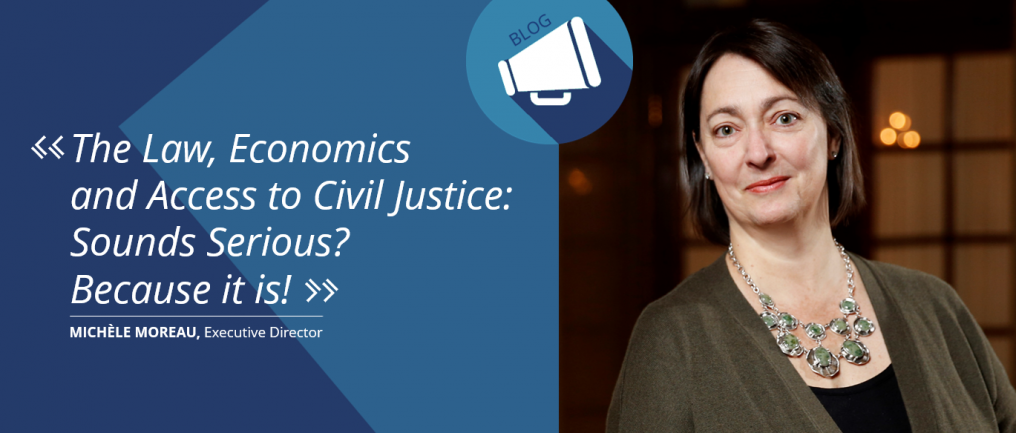The Law, Economics and Access to Civil Justice: Sounds Serious? Because it is!

The legal profession is at a turning point. More and more fellow citizens choose to confront their legal problems without the help of lawyers. Legal information is available to anyone who has a smart phone. Everyone has an opinion on any given legal matter making the news. The reputation of legal professionals is worse than ever.
For people interested in improving access to civil justice in Canada, maybe the time has come to listen closely to what experts on the Law and Economics have to say about the value and the price of the rule of law. Maybe the time has come to support our repeated claims for better access to justice with new arguments.
What insights can an economic focus lend to an analysis of how to improve civil justice? Can we put dollar figures on justice? Should we? Can justice be measured? What should the indicators be? Are we offering too much or too little access?
These questions will be at the heart of the exchange of ideas happening at the upcoming CIAJ Annual Conference taking place in Ottawa on October 5 to 7, 2016. Cease this opportunity to get involved in the conversation.
In what I call the ‘Access to Justice Community’, we often rely on the same ‘old’ examples to make our case for improving our justice system: lawyers are too expensive, delays are too long, the system is too complicated, etc.
What if we shifted the debate and brought forward economic justifications, from an institutional point of view, to support the case for bringing forward long-awaited changes? What would a market-oriented approach to re-building our justice system look like? Why don’t we show decision-makers what makes good business sense, what is economically effective? Isn’t it time we speak the same language than people who have to decide how much public money goes where?
But first, we need to develop metrics to assess the value, the cost of justice. On that point, I am curious to learn more about the research project led by the Canadian Forum on Civil Justice (CFCJ) on the cost of justice, not just in dollars but also in social cost. Their final report is due in the next few months. And in Quebec, Professor Pierre Noreau has recently been awarded a significant research grant to explore some metrics by implementing a series of pilot projects and measuring their efficiency (research consortium on access to law and justice : http://adaj.ca − in French)
Can we afford to continue doing exactly what we have been doing for years? The obvious answer is no, of course. There are some promising initiatives sprucing up everywhere, whether it is through the use of the latest technology to better meet people’s needs, or regulating the profession with an innovative and open-minded approach.
But to ensure success and put in place different ways of dealing with legal problems in our society, all of us need to shift our way of looking at the challenges and identify never-tried-before solutions. We need a complete change of culture.
What have we got to lose? Not that much, really. But we have so much to gain…
Ms. Michèle Moreau, Lawyer
CIAJ Executive Director

